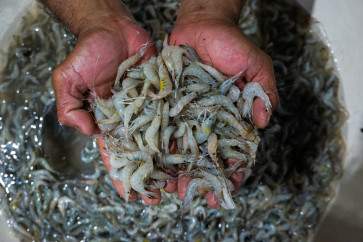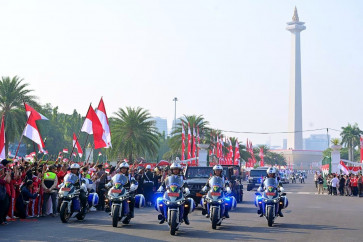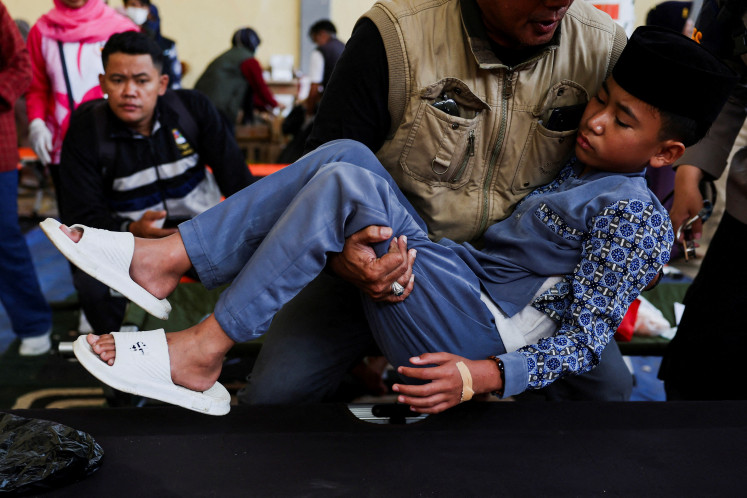Popular Reads
Top Results
Can't find what you're looking for?
View all search resultsPopular Reads
Top Results
Can't find what you're looking for?
View all search resultsState-owned banks boost SMEs businesses
Site visit: Bank Mandiri commercial and banking business director Sunarso (left) talks with two local residents who work in the cattle-breeding business in Lembang, West Java
Change text size
Gift Premium Articles
to Anyone
S
span class="caption">Site visit: Bank Mandiri commercial and banking business director Sunarso (left) talks with two local residents who work in the cattle-breeding business in Lembang, West Java. The two cow breeders are members of the Agropurna Mitra Mandiri Group, which has received loans from the bank. Antara
Being aware of the importance of small-and-medium enterprises (SMEs) to Indonesia's economy, a number of state-owned banks have created programs to boost the sector.
It can be said that SMEs are the backbone of Indonesia's economy. In 2012, SMEs accounted for the majority of enterprises in Indonesia and employed 107 million workers or almost 91 percent of Indonesia's workforce.
SMEs are also seen as an ideal way to create jobs in a time where job growth does not match that of the workforce, a situation which results in a high rate of unemployment.
Data has shown that of the country's total gross domestic product (GDP) in 2012, about 59 percent was contributed by SMEs. Under the SMEs category, micro businesses constituted 90 percent of all business units and the remainder made up of SME entrepreneurs.
Despite the high contribution of SMEs to Indonesia's economy, there is an unfortunate fact that the number of Indonesians untouched by financial services such as transfer, savings and loans remains high.
According to a 2010 World Bank survey, only 47 percent of Indonesia's population stores money in banks while only 17 percent borrow money from banks.
Meanwhile, in relevance to fund distribution to SMEs, December 2012 data from Bank Indonesia (BI) indicated that out of a total Rp 2.70 quadrillion worth of credit provisions, only Rp 526.4 trillion, or some 19 percent, were distributed to SMEs.
Umar Juoro, an economist at the Center for Information and Development Studies (CIDES) said that the data meant that the penetration of financing services to SMEs was very low.
Efforts to boost SMEs
Responding to SMEs' relatively low access to financing, a number of organizations are making efforts to help push the growth of SMEs. One of such organizations is Inotek, a foundation established by entrepreneur Sandiaga Uno, which provides funds to technology based SMEs.
Aside from NGOs, state-owned banks also play a big role in helping SMEs develop through loan provisions. Some of them have take further steps by including the development of SMEs in their agendas. The development program usually involves more than just the provision of loans but also training and mentoring schedules.
Bank Tabungan Pensiunan Nasional (BTPN) is one example. It incorporates the empowerment of SMEs into their corporate agenda. The bank has a program called Daya (Power).
'We believe that our mass market customers not only need financial access but also capacity development training and mentoring. The activities are included in the Daya program,' BTPN director Anika Faisal told The Jakarta Post.
The program is a measurable and sustainable empowerment program directed toward the bank's four business units, namely BTPN Purna Bakti, which caters to retired workers; BTPN Mitra Usaha Rakyat, which caters to SMEs; BTPN Sinaya which focuses on financing activities; as well as BTPN Syariah, which focuses on providing services to the productive yet underprivileged community.
For each of the program's targets, the bank conducts routine and continuous training programs at all of its branches. On average, the free-of-charge training can be conducted twice a month. The program is part of the bank's corporate social responsibility (CSR) program. The program had a diverse curriculum, Anika added.
'We adjust our programs to the characteristics, profile and needs of our customers. [But in general], we equip them with the skills of financial, business and human resources management, along with marketing skills,' she said.
In developing and evaluating the training materials, the bank cooperates with the Bogor Agriculture Institute's (IPB) business management department.
The bank also increases the number of its empowerment activities every year. In 2014, the bank conducted 143,277 of such activities, which constitutes a 59 percent increase year-on-year (yoy). Meanwhile, the number of participants in the program reached 1,770,299 bank customers or an increase of 16 percent yoy last year.
According to Anika, the CSR program has become an investment for the company, as the program benefits not only the recipients but also the firm itself.
'We have found a positive correlation between our empowerment program with our customers' compliance and loyalty. As customer enterprises continue to grow, they are able to pay their debts in a more disciplined way. This can be seen from our relatively low non-performing loan (NPL) rate. In December last year, for instance, our NPL ratio stood at 0.7 percent, far below the threshold set by regulators,' Anika said.
According to Anika, one of the keys to the success of the bank's empowerment program is innovation.
'We keep updating our training module based on our customers' ever changing needs. By constantly evaluating and renewing our module, [we find the keys to our program's success]. We also involve scholars and lecturers in developing our module,' she said.
Meanwhile, Bank Negara Indonesia (BNI) also conducts a similar activity called the partnership and environmental guidance program. The program seeks to improve people's economy through the provision of soft loans. The program is carried out nationwide and is distributed in villages through a cluster system. This is why the program is more popularly known as Kampoeng BNI (BNI villages).
The community development program attempts to highlight a particular product or skill that is very prominent in a particular village cluster. Through the program, residents in each village are trained to make the most of their superior commodities. Currently, the bank has built 27 communities nationwide with various superior commodities, most of which cover the creative industry, food resilience and fishery.
Aside from providing training and soft loans, the bank also lends facilities that help program participants boost business. Other grants include scholarships for family members of the bank's partners.
State-owned lender Mandiri also has a program that seeks to boost entrepreneurship skills among young Indonesians. The program is called Wirausaha Mandiri (Mandiri Entrepreneurs).
The program seeks to create a positive perception toward entrepreneurship among university students in an effort to encourage them to become entrepreneurs and create new jobs for the Indonesian workforce.
The program comprises workshops, awards for brilliant young entrepreneurs, scholarships and entrepreneurship training modules. (Sebastian Partogi)










